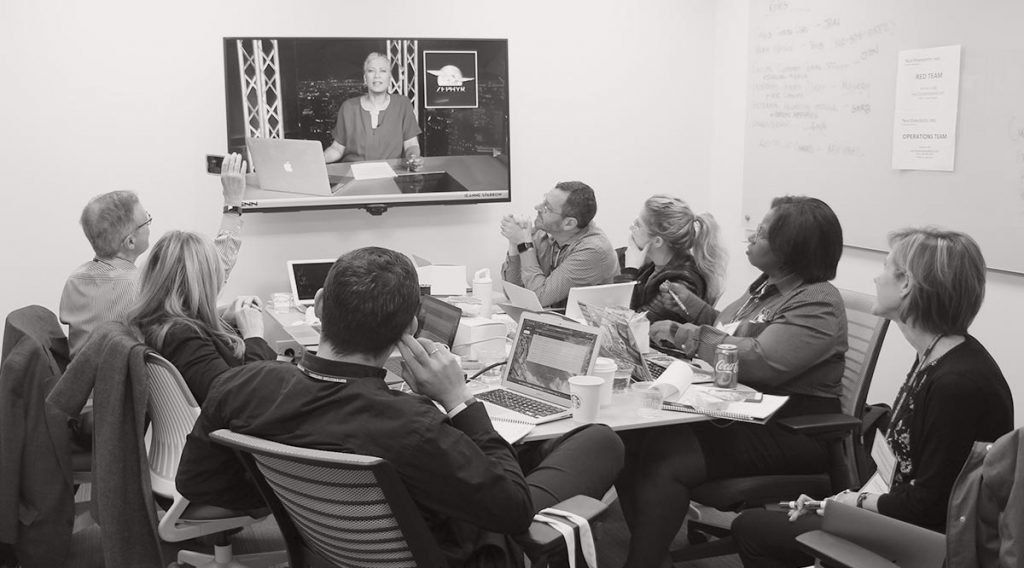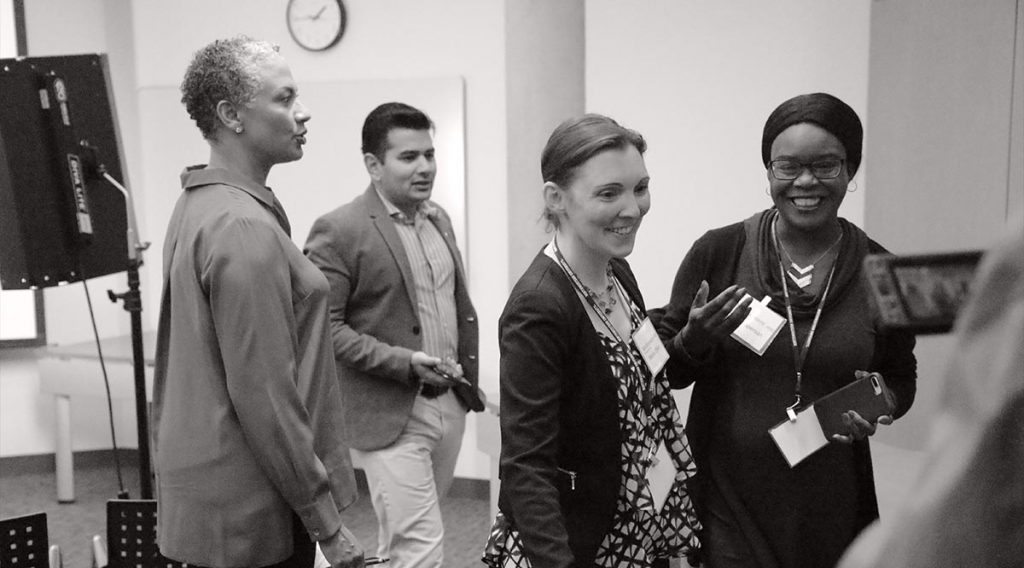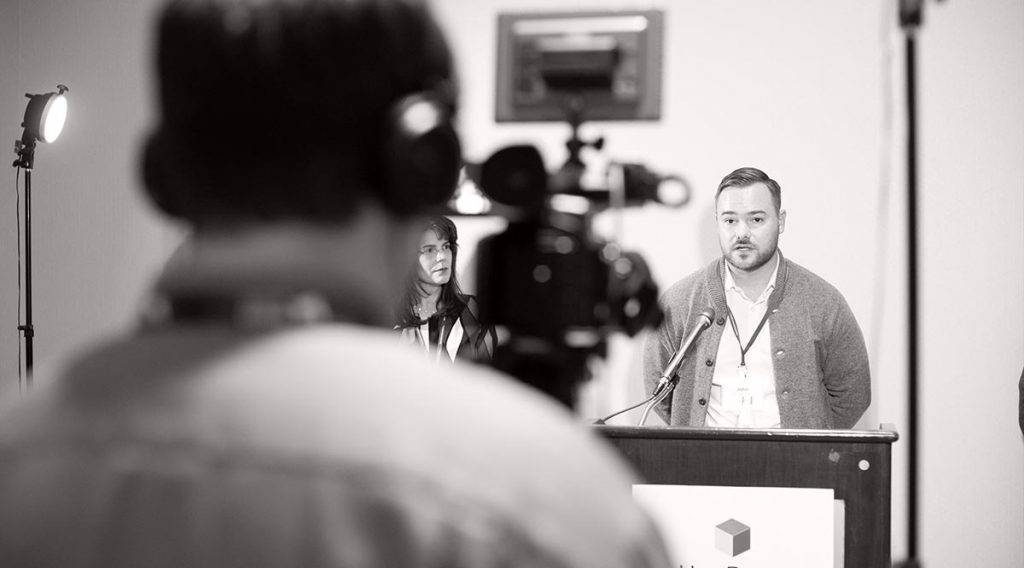Learning
Collaborating
Creating
Connecting
Visioning
Tanisha almost didn’t come to class that Saturday. She was still recovering from a harried week of work, her daughter seemed like she might be coming down with something and it just seemed better to stay home and recharge. She remembered, however, that in the orientation session one of the speakers on the alumni panel had advised that you should get as much as you could out of the short MSC year.
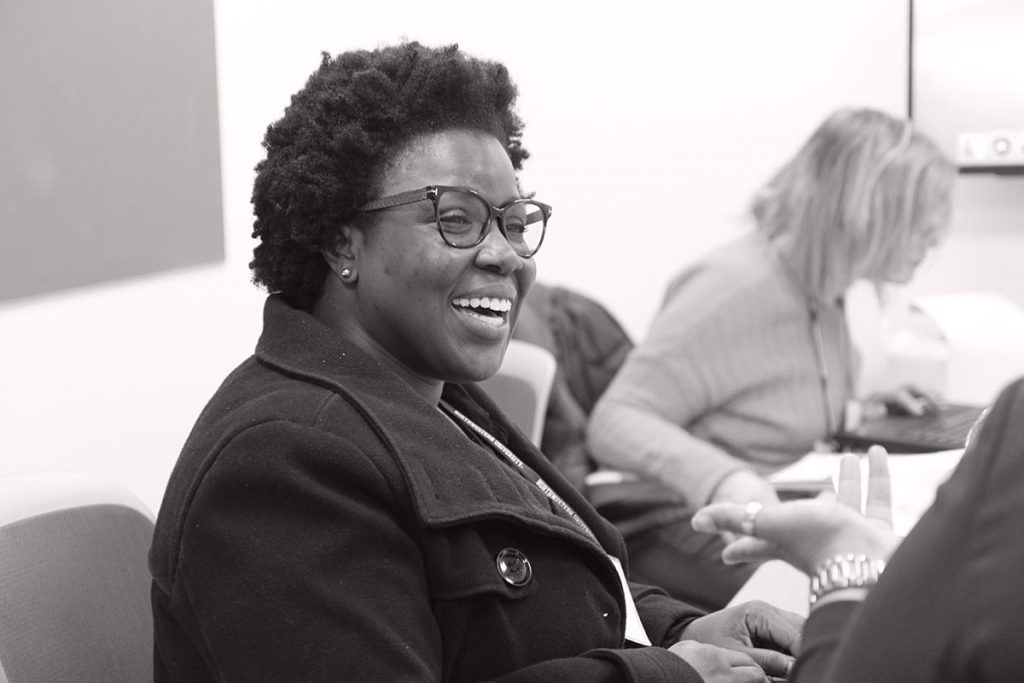
So, she kissed her family a quick goodbye, hurried herself out of the door, and headed up to Evanston. After grabbing a cup of coffee and catching up with several of her classmates, she took her place in the uber-cool workspace they call The Garage.
The Garage: Your Home Base
Designed to inspire innovation, the space reminded Tanisha of someone’s ideal of a particularly hip start-up office with exposed concrete walls, working garage doors, a cafe and makerspace. On weekdays and evenings, this space is filled with undergraduates working on group projects, but Saturdays belong to the MSC.
Experience-Based Lectures
Professor Leslie DeChurch cheerfully welcomed the class, reminded them of a project that would be due the following week and then launched into a fascinating lecture derived, in part, from her experience helping to train teams of NASA astronauts for the proposed manned mission to Mars.
The lecture bounced from personal experiences to a wide range of social psychology and communication theory, but what Tanisha kept thinking about was how she might act if she were the astronaut embarking on an eight-month mission in a small space with the same few people as companions.
She was fascinated with the amount of information that Professor DeChurch and her fellow researchers had been able to collect. They could predict the types of people who would work well together, and they could help individuals negotiate their own challenges while inspiring the team to complete complex and difficult tasks effectively.
Unusual Circumstances
After a break, a hot tea and some fresh fruit, Tanisha was assigned to a small group to participate in an exercise in which a team of explorers is forced to encounter a set of unusual circumstances.
Tanisha was not usually a fan of role-play exercises, but this one was so well tied to the lecture and the week’s reading that she found herself disappearing into the story. She knew how to recognize the challenges common to teams in many circumstances, not just this entertaining adventure simulation.
Amazingly, some of these theories applied to the obstacles before them actually seemed to work, bringing her team closer together and moving it toward its goal. Inevitably, some problems persisted and, even in partial failure, she found she was thinking about the material she had read the previous week in a new light.
Suddenly putting in that hour of reading before bed on Thursday evening felt like time well spent.
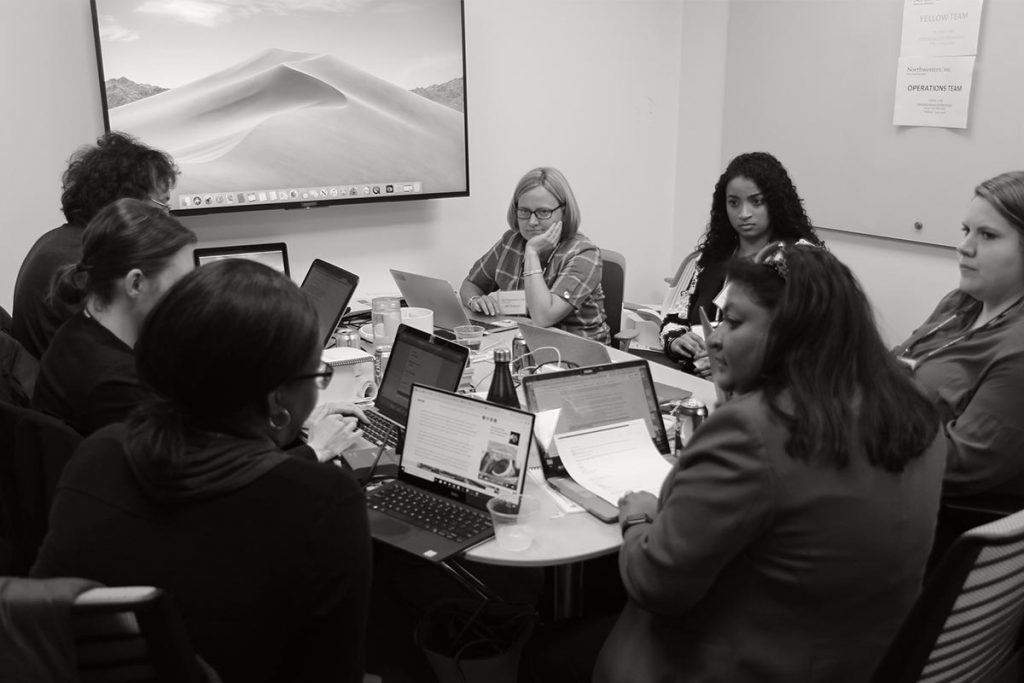
Processing the Day
On the walk to lunch, Tanisha remembered that she was to lead a staff meeting set up for the following Monday. She had been thinking it was going to be another round of the same dysfunctional information sharing and perhaps some bickering that would lead to nowhere.
This time, however, she had some new tricks up her sleeve that might get the team moving in sync, like a team of astronauts on a mission.
About The ATLAS Lab
Decoding dream teams
The ATLAS lab at Northwestern, located in the Frances Searle building – room 1-239, is uncovering the inner workings of teams, and enabling the design of large, diverse, digitally-connected teams on Earth and beyond.
Capstone Overview: Applied Research

Greta and Jacques entered the HLP program from opposite ends of the United States. Greta was the communication director for a medium-sized non-profit focused on sustainability and preserving open spaces. Jacques was a hospital administrator for one of the largest hospital systems in New York City.
Yet when it came time to choose a capstone research project, they shared a real-world challenge. Jacques and Greta both were interested in figuring how to improve stakeholder engagement in their organizations.
Stakeholder Engagement
Jacques’s hospital had grown rapidly over the past decade, in large part by acquiring smaller hospitals and medical practices. The organization’s strategy was to consolidate its resources by closing some hospitals, enlarging others, and leaving some facilities alone. This change strategy had been challenging for both employees and patients.
The birds-eye view of the strategically focused executives and consultants didn’t always seem to pick up the disruptions that were happening at the grass-roots level of the facilities. Jacques had actively championed the use of internal messaging and social media to give voice to both inside and outside stakeholders. The idea was to generate an active engagement focused on the reality of life in this organization that would promote better connections among all.
For Greta, the issue was how to keep employees at a non-profit organization engaged. The organization was headquartered in Northern California where the technology economy had driven up salaries, rents and other costs.
Employees obviously knew what they were choosing when they went to work for a non-profit, but employee feedback suggested that there was some frustration with the heavy workload combined with more modest compensation. Greta was looking for ways to increase employee engagement and connection to reduce turnover and increase satisfaction levels for inside stakeholders.
Qualitative Insights
After working closely with their Capstone advisor, both Jacques and Greta studied the appropriate research methods through their Capstone course. Then they began by collecting data. Jacques reviewed all of the posts on the hospital’s Instagram page, coding the messages for their effect (positive or negative) and for engagement (shares, likes and comments).
He used qualitative data analysis to examine the kinds of events and incidents that were generating posts and generated some suggested methods that the hospital could use to increase use of the Instagram portal and to demonstrate that the hospital could be empathetic and engage with stakeholders at the human level.
| Categories | Methodologies |
| Strategic Communication Assessment, Training & Development Package Case Development | Content Analysis Web Analytics Qualitative Analysis Quantitative Analysis Interviews & Focus Groups Surveys Questionnaires |
Greta began by surveying employees to determine which aspects of the organization’s values were most important and which the employees wanted most to see reflected in their day to day job tasks. She used a variety of mission and purpose documents to isolate the key values of the organization and asked employees to rank the importance of each.
Greta was also able to use a combination of some quantitative and some qualitative data (using information from her HLP course in research methods) to make some conclusions as to the best way to brand the organization to internal stakeholders in order to maximize employee engagement and connectedness.
Immediate Application
Jacques and Greta deepened their analysis by combining what they had learned from their research with the content of their course Understanding and Leveraging Networks. The course taught them to employ conceptual tools and techniques to assess existing communication networks and create plans to rewire the networks to meet the organizational goal.
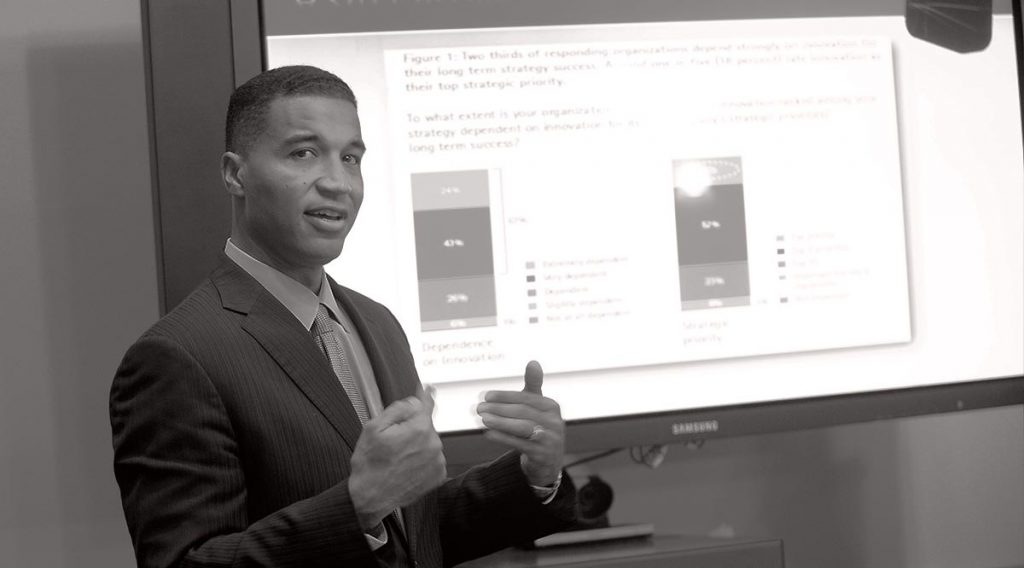
By moving through strategic communication assessment, training and development, and case development, Jacques and Greta were able the research findings and plans were presented by the students to their management providing a direct conduit from the MSC experience to specific and grounded ideas for organizational improvement.
Class for the CLP students begins at 9:30 Saturday morning. That’s plenty early for many students after a long week of work, family and other obligations. For the members of one of the MSC’s mastermind groups, however, the day starts promptly at 8:00 a.m. The group was formed after its members heard MSC lecturer Andy Crestodina, an industry expert in content marketing, search engine optimization and collaboration, present on the idea of mastermind groups. These five women, Cheryl, Theresa, Xin, Macy and Stephanie are all mid-career professionals who were looking for support, ideas and accountability from their peers as they navigated their MSC journey and looked forward to the changes they were anticipating after graduation.
The Power of the Group
Mastermind groups are no new fad. The word was coined by Napoleon Hill in his classic set of pamphlets published as The Laws of Success, one of the first popular self-help manuals. The idea is simple: a group of peers meet to help solve problems or generate ideas on behalf of one or more of the members. In the MSC groups, meetings usually focus on one of the members and then rotate, so that each member gets the benefit of its own personal board of advisors for a session.
Topics can range from specific work or wife/life balance challenges to defining the arc of a career. Members might need help figuring out how to renegotiate a job description, deal with a condescending supervisor or practice an upcoming presentation or interview. In other cases, members may hold joint discussions where they discuss concepts from their classes that are particularly interesting or inspiring. They may suggest books or other materials and sometimes they just have fun sharing the latest Tik-Tok viral silliness.
Stronger Together, Longer
MSC students have always formed close friendships with their cohorts. Many of these friendships continue long after the MSC year has passed. The mastermind concept takes the power of these relationships and focuses it. In this group, each of the members takes her career very seriously.
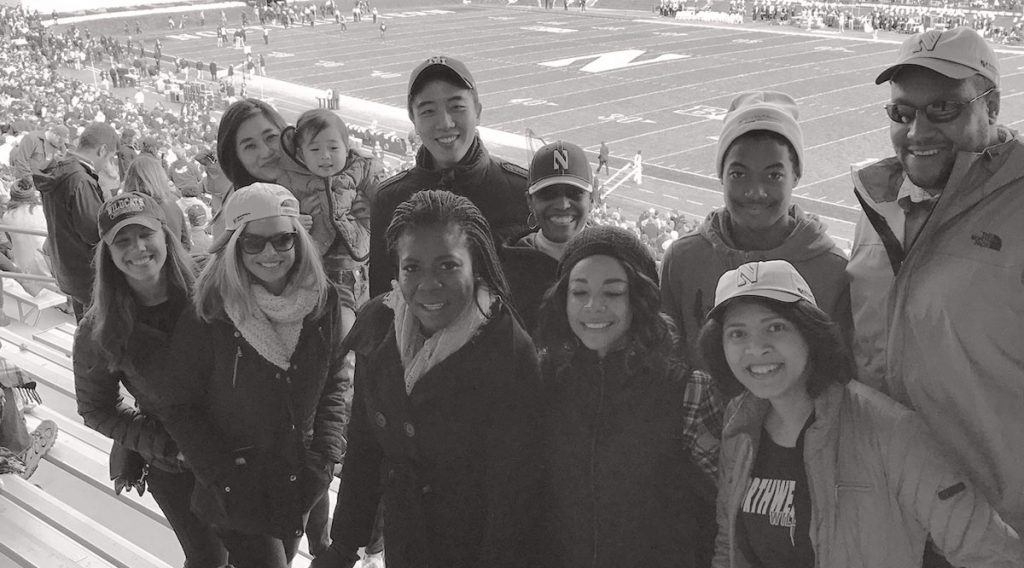
Cheryl feels constrained in her current role and wants to find a new position where she can take on more responsibility. Theresa has been working in government and wants to transition to a management role in a non-profit organization. Xin is an international student, younger than the others, but just as focused. She is looking to find a marketing position for a luxury brand either in the US or China. Macy has been a classroom teacher for 10 years and now wants to take her love of communication in a new direction. Finally, Stephanie is an engineer who has been tapped for a management role in her company. She is confident of her ability but knows that she is moving into an area that few women in her organization have been accepted.
A New Level of Graduate School
Each week’s meetings have an agenda, an informal presentation, an exchange of ideas, a lot of laughter and the occasional tear. This group builds solidarity, focuses the classroom lessons, and solves problems. But much more importantly, the members build connections and learn from each other in ways that no classroom could ever duplicate. The members of the mastermind group build a powerful network that takes the graduate school experience to a new level.
Adrian and Juanita found their way to the MSC through completely different routes, but with the same goal—being able to feel more in control of their own destinies.
Adrian had been working in talent development for almost twenty years. He was now managing 18 recruiters placing software engineers in firms throughout the eastern and midwestern United States. Juanita had been working in outdoor advertising for almost 8 years, receiving two promotions and was firmly on the management track. Both were successful and had bright futures, but they both sometimes wondered who they really were-what made them tick.
It was this desire to know themselves better that led Adrian and Juanita to enroll in the MSC program. Adrian joined the HLP program, which gave him the ability to keep up with his heavy travel schedule. Juanita entered the CLP program and it’s predictable and manageable Saturday schedule.
Both Adrian and Juanita thought that their journey of self-improvement would take place primarily in the context of formal classes, however they were both surprised to learn how much more there was to the MSC program that encouraged the type of reflection and self-discovery they were craving. The best part was this was a guided self-study that made them center the work in otherwise busy lives where they may have put it off indefinitely.
Reflection and Self-Discovery
Adrian went into his career coaching session with some ambivalence. He wasn’t looking for a new job and, in fact, getting jobs for people was his job. So, he was surprised when the coach didn’t just look at his resume, she began to ask him about his values.
She explained the idea of a value proposition, which is a combination of professional and personal experience and deep values he represents, a kind of resume that transcended the job titles and responsibilities he would normally list. Instead, he began to understand that one of the parts of his job he got the most pleasure from was counseling. He loved mentoring his direct reports and he loved helping candidates find the best places for their skills, personality and working style.
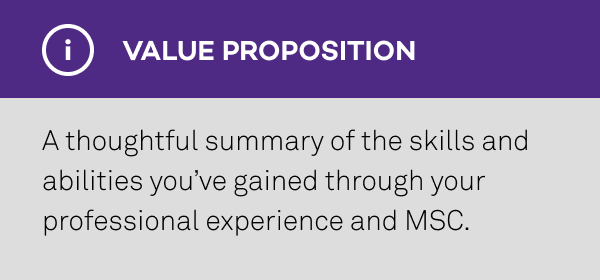
Adrian discovered that he had advanced expertise in collaborating with the other students in the cohort. He didn’t just enjoy working together on group projects, he found he loved the late-night discussions on the cohort Whatsapp channel, talking about classes one minute and talking about work stress or Wildcat Basketball the next.
These discussions combined with the intense in-residence weekends had made this group of the people some of the closest new friends he had made since college. He also had the chance to personally connect with his professors and the MSC staff and found that they completely understood the journey he was taking.
Co-Curricular Experiences
Juanita loved her classes from the beginning, but it was the co-curricular programs that really surprised her. She and her classmates were all looking for meaning in their work that went beyond job performance and sales records. One of the best nights was listening to Jeanne Sparrow, an MSC graduate and frequent MSC speaker, talk about finding and telling your own story. Jeanne was fascinating to listen to; she had fun stories about being on TV and radio in the Chicago area. She understood the barriers that kept people from speaking their truths and in listening to the quiet voice inside even when the world was loudest. Her presentation was part technical workshop and part motivational.
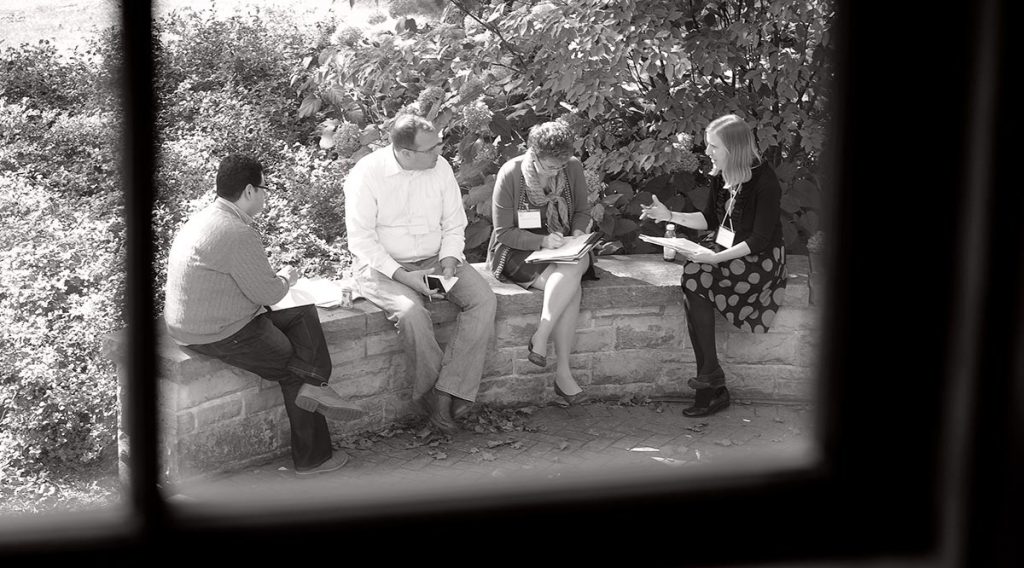
Whatever it was, Juanita knew that she felt so much more energized at the end of the presentation than she did at the beginning. She felt that she had the confidence to speak with her supervisor about a new role, one that she had been too intimidated to speak about prior to entering the MSC.
Finding and Navigating the Path
MSC students like Adrian and Juanita get much more than knowledge from their MSC experience. They can find that their ability to envision a path, to overcome adversity and to find a convergence between their career and their true selves.

